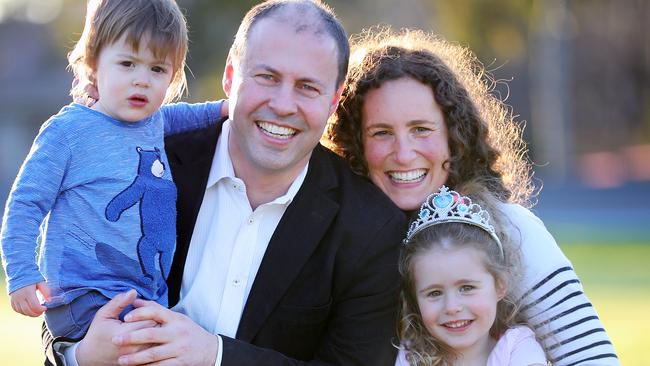From shorts change to cash Daddy for Josh Frydenberg
The chatter at the Frydenberg household as tax cuts passed the Senate highlighted a dramatic six months in politics.

On Thursday night, Amie Frydenberg texted her husband to congratulate him. The government’s $158 billion income tax cuts had just passed the Senate.
As a proud Josh Frydenberg tells it, the chatter over dinner back home in Melbourne that night between Mum and kids, Blake, 2, and Gemma, 4, highlighted just how dramatic the past six months in politics had been.
Blake: “Where is Daddy?’’
“Still in Canberra,’’ says Mum.
Gemma: “Why isn’t he home yet?’’ Amie: “Because he has a lot of work to do.’’
Blake: “Because he is the Treasurer?’’
Gemma: “Yes, he needs to make sure everyone in Australia has money.”
Just months earlier, the Frydenberg family wasn’t so breezy about what lay ahead.
Frydenberg had been Treasurer for barely four months and was still suffering the ignominy of having his signature policy as energy minister, the national energy guarantee, torn up by Malcolm Turnbull in a final bid to save his leadership.
Some of his colleagues doubted he was up to the task. And by the end of December it appeared the government was doomed. After the release of the mid-year economic update, the family headed to his parents’ beach house in Lorne, on Victoria’s Great Ocean Road.
Frydenberg wanted to switch off and wash away the events of the past year. “I think I said: ‘Darling, I want to turn off the phone for three weeks.’
“I packed only shorts and T-shirts. I had to walk the talk.”
Days into the break, he borrowed a pair of pants and shirt from his dad, stepped out of the house while the kids were asleep, walked up the hill to where a TV camera was waiting to record what was to be his withering attack on Bill Shorten’s negative gearing policy.
“I had to get my dad to hold the phone to take the audio to send back to the office,” Frydenberg told The Weekend Australian yesterday. “I literally had to borrow his shirt and a pair of pants.”
Frydenberg had seen an opening in this first few weeks of the new year while the opposition napped in the naive comfort that no one takes any notice of politics over summer.
He spent three weeks over January writing opinion pieces for newspapers, recording grabs for the nightly television news and pestering morning radio listeners.
Frydenberg was everywhere.
Scott Morrison had asked him to come up with a plan for cutting income tax around which they could frame an early budget, take to an election and at the same time refuel the economy.
And it had to be delivered within the framework of a budget surplus. This was non-negotiable.
The Prime Minister, a former treasurer, had delivered the first instalment of tax measures with the $144bn package passed last year.
But the government could not present to the electorate its own plan to reduce personal income tax until it had destroyed Labor’s more complicated version of tax reform.
And so the dismantling began.
The first hint that the government was planning a new round of big tax cuts came in the December Mid-year Economic and Fiscal Outlook.
More than $9bn was hived out of the estimates, which pointed to a narrow surplus, the first in 12 years.
But the warnings of significant downside risk to the economy had also become apparent.
The tax plan had become an economic stimulus plan.
By late January, Frydenberg had worked up several options with Treasury officials and took them to Kirribilli House to show Morrison.
“We needed short-term relief and long-term reform,” Frydenberg said of the discussions with the Prime Minister.
“But before we could outline our tax plan to the people in the budget, we needed to completely expose Labor’s high-tax agenda — and the impact it would have on jobs, growth and aspiration.”
As if on cue, Labor jumped in to help them with it.
On January 30, the opposition’s then Treasury spokesman, Chris Bowen, made his now infamous remark — that if people didn’t like Labor’s $50bn policy to abolish franking credit refunds for retirees, they didn’t have to vote for them.
The Australian splashed the remarks on the front page — “ALP goads seniors: vote against us”.
From that point on, pressure began to build.
When Frydenberg handed down his budget, the Treasurer and his Prime Minister both started to believe they were back in the hunt.
In the week following the budget, the Liberal Party’s internal polling had the Coalition’s primary vote, which had been on life support for 2½ years, picking up from 38 per cent to 41 per cent.
Knowing Morrison was poised to call the election, Frydenberg took advantage.
Before the government entered caretaker mode, he asked Treasury to model various different tax scenarios. He was careful not to frame it as modelling of Labor’s policy, as this would have been rejected by Treasury.
It’s a trickery used by all governments and treasurers.
On the first day of the campaign, the government rolled out a number that would become an albatross around Bill Shorten’s neck for the next five weeks — $387bn in new Labor taxes.
The narrative was complete. Labor was proposing to take money off people through taxes; the government was offering to give back to them.
Frydenberg, who was forced to retreat to his electorate of Kooyong for the entire campaign over fears he might lose his inner-city seat, wasted no time following the election victory that even he was surprised by.
He immediately teamed up with Senate leader and Finance Minister Mathias Cormann to begin the campaign to get their tax cuts passed.
Frydenberg recalls phoning Tasmanian crossbencher Jacqui Lambie. She told him that while she liked him, she didn’t even know whether she had been elected.
It was then left to Cormann to bring home the bacon. He had lobbied successfully to get the support in a more hostile Senate last year for the government’s first $144bn income tax plan.
On June 16, Morrison flew to Fiji for a family holiday. Frydenberg was overseas too, having gone to Japan for the G20 finance ministers meeting before a visit to Britain, Europe and the US.
Cormann was left to continue the negotiations with the Senate crossbenchers as the return to parliament approached.
But it wasn’t until Wednesday night, 12 hours before the bill would come before the Senate, that Cormann would finally land Lambie and the Centre Alliance.
With Australian Conservatives senator Cory Bernardi already locked in, the four votes they needed to pass the tax bill were secured.
Frydenberg’s tax plan had come a long way since the hot summer days in Lorne. And even he would now have to admit that he would have then given it low odds of ever being legislated.




To join the conversation, please log in. Don't have an account? Register
Join the conversation, you are commenting as Logout